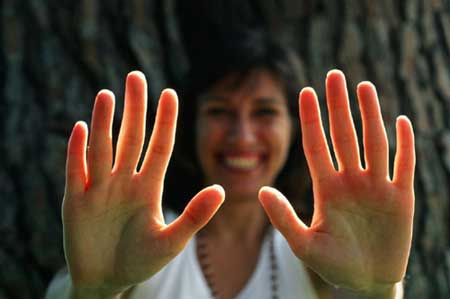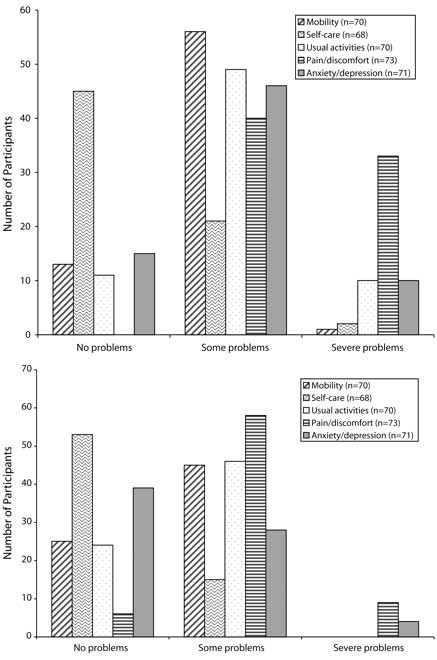Reiki Questions and Answers
March 4, 2011 Written by JP [Font too small?]Some natural health practices are more difficult for allopathic physicians to accept than others. Take, for instance, herbal extracts. Herbs and prescriptive medications are essentially comprised of one or many chemicals which are responsible for their therapeutic activity. Western medicine is largely based upon this model and quite comfortable with it. So called “energy” therapies such acupuncture, Qi Gong and Reiki are another story. The concept of accessing the power of healing energy simply doesn’t jive with the modern, Western view of medicine.

The ardent disbelief that some conventional physicians have with respect to energy medicine has lead many of them to dismiss these modalities altogether. Some go so far as to rally against any research on the topic. After all, allocating precious resources on a lost cause is, well, a lost cause. This isn’t the position that I take and, fortunately, it hasn’t stopped a small band of open minded scientists from evaluating the merits of these mysterious practices.
The modern interpretation of Reiki is a relatively recent entry into the field of energy healing. According to the National Center for Complementary and Alternative Medicine, Reiki was first popularized in the late 1930s by Hawayo Takata, an American of Japanese decent. In a typical Reiki session, a practitioner places his hands “lightly on or just above the person receiving treatment, with the goal of facilitating the person’s own healing response”. (1)
There have been five studies on Reiki published in prestigious, peer-reviewed medical journals since the beginning of 2010. The most recent appeared in the September 2010 issue of the Journal of the American College of Cardiology. In it, 49 patients recovering from acute coronary syndrome (ACS) were randomly assigned to receive: a) Reiki therapy; b) “a classical musical intervention” or; c) rest over the course of 72 hours. During the 3-day trial period, all of the participants were studied via continuous electrocariographic monitoring and quizzed about their emotional state. Those undergoing Reiki treatment demonstrated beneficial changes in heart rate variability (HRV) and emotional state – a decrease in negative emotions (anger, anxiety, frustration, sadness) and an increase in positive emotional states (calmness, happiness, relaxation). Improvements in HRV are indicative of a protective effect in patients with acute coronary syndrome. What’s more, the authors of the study concluded that this noted effect may allow for a safe and viable nonpharmacological approach to treating this patient population. (2)
One of the most encouraging aspects to the current batch of studies on Reiki is that the benefits impact a wide variety of people, whether young or old, sick or well, patient or healer. The August 2010 edition of the Journal of Holistic Nursing reveals that registered nurses can effectively use “self-Reiki” to reduce work-related stress and potentially limit the risk of “burn out”. In July 2010, researchers from the University of Southern Maine published a study revealing that Reiki conferred a meaningful decline in anxiety, depression and pain scores in a group of older adults living in a nursing home setting. Among the seniors, a more in-depth analysis described five categories of physical and psychological response: curiosity and a desire to learn more; enhanced self-care; improved physical symptoms, mood and well-being; relaxation; sensory and cognitive responses to Reiki. (3,4)
The two remaining trials examined the following: 1) the mind-body effects of ten 20-minute Reiki sessions over a 12 week period in a group of “35 healthy psychology undergraduates”; 2) the impact of a Reiki intervention on colonoscopy-related anxiety. In the first experiment, the participating students receiving Reiki treatment “had a tendency towards a reduction in illness symptoms” during the academic year, whereas the comparison group undergoing relaxation/self-hypnosis did not. In the secondary trial, the use of Reiki prior to colonoscopy resulted in a reduction in diastolic and systolic blood pressure (-4 mmHg and -10 mmHg), heart rate (-9 beats/minute) and respirations (-3 breaths/minute). All of these findings point to a decline in physical manifestations of anxiety. A trend toward a lesser need for pain medication was also evidenced. (5,6)
The Impact of Energy Work on Various Mental & Physical Symptoms

Source: January 2004, Vol 94, No. 1 | American Journal of Public Health 50-52 (link)
In order to provide a balanced perspective about Reiki, I must also address the fact that some studies have failed to find any benefits from this therapy. Two widely publicized trials examining the impact of Reiki on fibromyalgia and stroke recovery are examples of where an absence of affect was reported. In addition, a systematic review from November 2009 remarked that, “The serious methodological and reporting limitations of limited existing Reiki studies preclude a definitive conclusion on its effectiveness. High-quality randomized controlled trials are needed to address the effectiveness of Reiki over placebo”. (7,8,9)
I can’t tell you with any certainty whether the healing energy of reiki is real or not. But I do know that some people have the ability to affect others in profoundly positive ways via touch or even simply by being in their presence. Most of us have experienced that very phenomenon in a medical setting or elsewhere. So perhaps, just perhaps, these unique individuals may be able to direct these positive attributes in a decidedly health promoting manner. Some might call this a placebo effect, practitioner influence or various other terms that are usually considered pejorative. I don’t buy into that frame of mind. I most certainly welcome more studies that scientifically scrutinize the benefits of Reiki or lack thereof, and other energy work. However, given the current level of evidence and understanding about Reiki, I feel comfortable enough to recommend it as a promising modality that may just help and is unlikely to harm.
Note: Please check out the “Comments & Updates” section of this blog – at the bottom of the page. You can find the latest research about this topic there!
Be well!
JP
Tags: High Blood Pressure, Reiki, Stress
Posted in Alternative Therapies, Heart Health, Mental Health

March 4th, 2011 at 11:41 pm
So many people are quick to dismiss the healing power of techniques outside the mainstream allopathic model of health care. But the reality is that our “pill for every ill philosophy” mentality isn’t always the best option. We live in an extremely over medicated culture where more people die from prescribed medications then illegal drugs every year. We need to shift the focus of our health efforts back towards proper diet and exercise. Further, exploring a safe non-invasive healing modality is certainly not a bad thing.
March 5th, 2011 at 1:47 pm
Agreed, Dr. John. Thank you for sharing your P.O.V.
Be well!
JP
March 9th, 2011 at 4:04 pm
AWESOME post. I have been practicing Reiki for nearly a decade and it really has enriched my life. I have encountered several energy healing skeptics who have changed their mind after just one session. It is a beautiful healing modality and I am happy to see people writing about it and talking about it.
March 10th, 2011 at 1:26 pm
Many thanks, HH! I’m very happy to hear about your success and that you’re sharing it with others. Wonderful! 🙂
Be well!
JP
April 5th, 2011 at 2:59 pm
Thank-you for this article. I have been a Reiki Practitioner for the past three years and have not found one of my clients yet that has not had a positive effect. This is very enlightening for me since I come from a health (western medicine) background where I was trained to believe there had to be published studies to substantiate anything. I do volunteer work providing Reiki for hospice patients. Many of them in great pain and very agitated. It is so gratifying to provide them some relief. I am a firm believer in using and promoting anything which can help us be healthy and happy naturally. Reiki has been a very simple and effective process for me!
April 5th, 2011 at 7:30 pm
Thank you for your input, Sherry. It’s good to have a practitioners perspective. Keep up the good work!
Be well!
JP
May 31st, 2015 at 1:15 pm
Update 05/31/15:
http://www.ncbi.nlm.nih.gov/pubmed/26025798
Pain Manag Nurs. 2015 Jun;16(3):388-99.
Effects of Reiki on Post-cesarean Delivery Pain, Anxiety, and Hemodynamic Parameters: A Randomized, Controlled Clinical Trial.
The aim of this study was to investigate the effect of Reiki on pain, anxiety, and hemodynamic parameters on postoperative days 1 and 2 in patients who had undergone cesarean delivery. The design of this study was a randomized, controlled clinical trial. The study took place between February and July 2011 in the Obstetrical Unit at Odemis Public Hospital in Izmir, Turkey. Ninety patients equalized by age and number of births were randomly assigned to either a Reiki group or a control group (a rest without treatment). Treatment applied to both groups in the first 24 and 48 hours after delivery for a total of 30 minutes to 10 identified regions of the body for 3 minutes each. Reiki was applied for 2 days once a day (in the first 24 and 48 hours) within 4-8 hours of the administration of standard analgesic, which was administered intravenously by a nurse. A visual analog scale and the State Anxiety Inventory were used to measure pain and anxiety. Hemodynamic parameters, including blood pressure (systolic and diastolic), pulse and breathing rates, and analgesic requirements also were recorded. Statistically significant differences in pain intensity (p = .000), anxiety value (p = .000), and breathing rate (p = .000) measured over time were found between the two groups. There was a statistically significant difference between the two groups in the time (p = .000) and number (p = .000) of analgesics needed after Reiki application and a rest without treatment. Results showed that Reiki application reduced the intensity of pain, the value of anxiety, and the breathing rate, as well as the need for and number of analgesics. However, it did not affect blood pressure or pulse rate. Reiki application as a nursing intervention is recommended as a pain and anxiety-relieving method in women after cesarean delivery.
Be well!
JP
January 25th, 2017 at 12:17 am
Updated 01/24/17:
https://www.ncbi.nlm.nih.gov/pmc/articles/PMC5172615/
Rev Lat Am Enfermagem. 2016 Nov 28;24:e2834.
Massage and Reiki used to reduce stress and anxiety: Randomized Clinical Trial.
Objective: to evaluate the effectiveness of massage and reiki in the reduction of stress and anxiety in clients at the Institute for Integrated and Oriental Therapy in Sao Paulo (Brazil).
Method: clinical tests randomly done in parallel with an initial sample of 122 people divided into three groups: Massage + Rest (G1), Massage + Reiki (G2) and a Control group without intervention (G3). The Stress Systems list and the Trace State Anxiety Inventory were used to evaluate the groups at the start and after 8 sessions (1 month), during 2015.
Results: there were statistical differences (p = 0.000) according to the ANOVA (Analysis of Variance) for the stress amongst the groups 2 and 3 (p = 0.014) with a 33% reductions and a Cohen of 0.78. In relation to anxiety-state, there was a reduction in the intervention groups compared with the control group (p < 0.01) with a 21% reduction in group 2 (Cohen of 1.18) and a 16% reduction for group 1 (Cohen of 1.14). Conclusion: Massage + Reiki produced better results amongst the groups and the conclusion is for further studies to be done with the use of a placebo group to evaluate the impact of the technique separate from other techniques. Be well! JP